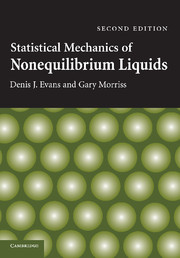Book contents
- Frontmatter
- Contents
- Preface to the second edition
- Preface to the first edition
- 1 Introduction
- 2 Linear irreversible thermodynamics
- 3 The microscopic connection
- 4 The Green—kubo relations
- 5 Linear-response theory
- 6 Computer simulation algorithms
- 7 Nonlinear response theory
- 8 Dynamical stability
- 9 Nonequilibrium fluctuations
- 10 Thermodynamics of steady states
- References
- Index
5 - Linear-response theory
Published online by Cambridge University Press: 06 November 2009
- Frontmatter
- Contents
- Preface to the second edition
- Preface to the first edition
- 1 Introduction
- 2 Linear irreversible thermodynamics
- 3 The microscopic connection
- 4 The Green—kubo relations
- 5 Linear-response theory
- 6 Computer simulation algorithms
- 7 Nonlinear response theory
- 8 Dynamical stability
- 9 Nonequilibrium fluctuations
- 10 Thermodynamics of steady states
- References
- Index
Summary
Adiabatic linear response theory
In this chapter we will discuss how an external field Fe, perturbs an N-particle system. We assume that the field is sufficiently weak that only the linear response of the system need be considered. These considerations will lead us to equilibrium fluctuation expressions for mechanical transport coefficients such as electrical conductivity. These expressions are formally identical to the Green—Kubo formulae that were derived in the last chapter. The difference is that the Green—Kubo formulae pertain to thermal transport processes where boundary conditions perturb the system away from equilibrium — all Navier—Stokes processes fall into this category. Mechanical transport coefficients, on the other hand, refer to systems where mechanical fields which appear explicitly in the equations of motion for the system, drive the system away from equilibrium. As we will see, it is no coincidence that there is such a close similarity between the fluctuation expressions for thermal and mechanical transport coefficients. In fact one can often mathematically transform the nonequilibrium boundary conditions for a thermal transport process into a mechanical field. The two representations of the system are then said to be congruent.
A major difference between the derivations of the equilibrium fluctuation expressions for the two representations is that in the mechanical case one does not need to invoke Onsager's regression hypothesis.
Information
- Type
- Chapter
- Information
- Statistical Mechanics of Nonequilibrium Liquids , pp. 95 - 118Publisher: Cambridge University PressPrint publication year: 2008
